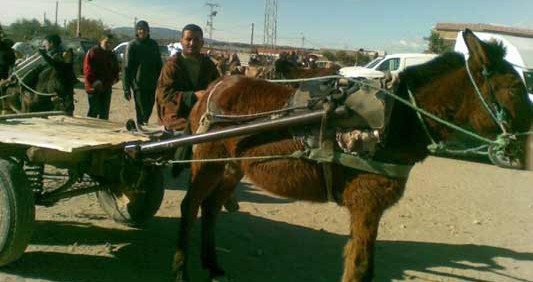According to the age pyramid drawn up by the National Institute of Statistics in Tunis, 54.3% of the adult population is under 30 years of age (http://www.ins.nat.tn/indexfr.php). In spite of the increasing percentage of old people, Tunisia's population is still fundamentally young. That is why drawing a portrait of Tunisia's youth involves an investigation of how the country will evolve. The Tunisia of tomorrow will look very much like its young people of today.
The widespread schooling begun after Tunisia gained independence in 1956 yielded results which are more or less visible today. The average young Tunisian has undergone at least 10 years of schooling. In addition there has been a real boom in the number of young Tunisians pursuing University studies. Since the introduction of tertiary qualifications (B.A /M.A /Ph.D), the number of students enrolling at University has seen an unprecedented increase; a phenomenon which can also be explained by the lack of job opportunities. The labour market is too restricted for graduates; likewise the country's foreign policy is not able to open up job opportunities in the countries of North Africa and the Gulf. Tens of thousands of graduates are looking for work or are working in sectors they have not been trained for. An example is Mohammed Ali, a 24 year-old graduate in Industrial Maintenance who works as a graphics designer in his cousin's workshop producing posters for advertising.
Contrary to what one might imagine the craze for emigration is a phenomenon which is on the decline, at least amongst young Tunisians. Candidates for emigration are most likely to be found among those with a low level of education. University graduates, if they ever dream of emigrating, choose destinations other than the classic ones: the USA or Canada, for instance, instead of France, Italy or Germany. These latter countries remain very popular in disadvantaged quarters where people still think of Europe as an Eldorado.
In addition to the above we need to understand a new phenomenon which is emerging - young girls too are now dreaming of emigration. The range of people wanting to emigrate is getting wider. Emigration for some underprivileged milieux has become a reason for existing. The case of Sebti is an excellent illustration of this. A 27 year- old who left school at the age of ten, he drives a donkey cart in Sbeitla, one of the most disadvantaged towns in Tunisia. He transports goods and people to make a living. Sebti has to support his five sisters and three brothers. He dreams of emigrating. He says that he is suffering hardship and that he is ready to steal the sum of three thousand dinars (about 1600 euros) to collect enough money to pay a smuggler to get him out of Tunisia and take him to Italy. Sebti is not intending to settle in Italy; he's just counting on saving up enough money to open a café in Sbeitla. Sebti's dream is very much like that of his whole generation. A job in the civil service is no longer a young person's dream. Raised in an era of economic liberalism, starting a new business of their own is this generation's ideal. However, when it comes to social structure this generation is quite conservative; with the exception of the few who would love to have a relationship without ties, the majority still see themselves as getting married and starting a family. All this seems to mirror the country as a whole.
This conservatism is clearly visible in the relationship between young people and their families. Although the majority of young people interviewed admitted having differences of opinion with their parents from time to time, they all agreed that they have an excellent or very good relationship with their parents. Many a time the answer we received to questions about family relationships was "very good, of course"; so close is the family to being a taboo in Tunisia. Gone are the times when generational conflicts tore Tunisian families apart and two different visions of the world clashed. Today it seems they only argue about trivial things. Should we blame it on the economic crisis which, instead of breaking up the institution of the family, is consolidating it? Or on the influence of religion that is pacifying these contradictions?? It is difficult to say which; but the fact is that young Tunisians, although attracted by fashion and all things modern, are still very much attached to their traditions, considering them a vital aspect of their cultural identity. Today's young Tunisians are less rebellious than their parents were in the 1970s and they are inflexible when it comes to issues regarding their identity. These issues, moreover, are the basis of their political engagement. When interviewed about their political views, most young Tunisians replied by saying that "politics are of no interest to me"; but one must not deduce from that that young Tunisians disregard politics completely. The only person who showed political engagement and replied by saying "yes" went on immediately to quote a slogan used by RCD (the party in power since independence) during the electoral campaign - " I am Tunisian and proud to be so". Therefore the answer "politics is of no interest to me" seems more likely to be the result of excessive caution. Those young Tunisians who were interested in politics said they watched the news (without stipulating on which TV channel) to keep abreast with the situation in Iraq and Palestine, two burning issues which are concerned with Arab and Moslem identity. On the whole it is very common for young Tunisians not to be interested in public affairs and in what is happening around them.
This is perhaps why globalisation is perceived of as a fiction which many young people either don't understand at all or approve of only in as much as it does not concern them. Sahar, 20 years of age and in her third year studying English at University, explains this: "I am in favour of globalisation, but not in our country because unfortunately young Tunisians only adopt the negative sides of it". (Yet another paradox!) However, there seems to be full agreement when it comes to Information and other New Technologies. The latter are fully embraced, no doubt since they are deemed to be the answer to the country's top priority, namely development.
Drugs do not present a real threat to such cautious young people. Without constituting a real scourge, alcohol and drugs are perceived of as social evils often associated with adolescence and not necessarily linked to the children of Nouveaux Riches. This can perhaps be explained by the lack of social benchmarks. Young Tunisians are often well aware of STD prevention; they are rather careful when it comes to sexual adventures (even though they believe that pre-marital sexual experiences can be beneficial), considering marriage to be the best framework for a balanced sexual relationship. One wonders how they reconcile pre-marital sex and the cult of virginity which is still very much alive in Tunisia, where girls undergo plastic surgery on the hymen. A paradox once again, but this doesn't stop these young Tunisians from smiling broadly when asked what youth means for them. For Fadhila, 21 years of age, being young is "all about juggling my studies, going out with friends, having a good time and going to the theatre; obviously one has to be living in Tunis". Likewise for all of them, it is - though it may be a platitude to say it - the best time of their lives.
If we take this to be a reliable picture of Tunisian youth then we can deduce that there is not much likelihood of major socio-political or cultural changes. Tunisia seems to be a country that is changing, yet without changing either identity or even profile.
young mediterraneans
A Portrait of Tunisian Youth
In spite of the increase in the percentage of old people, Tunisia still remains a "young" country. This is the reason why drawing a picture on youth is also giving a picture of the country's evolution. The Tunisia of tomorrow will look like the young people of today.

bu haberin uzantıları
ilgili haberler
Hak odaklı, çok sesli, bağımsız gazeteciliği güçlendirmek için bianet desteğinizi bekliyor.
bu haberin uzantıları
ilgili haberler
diğer yazıları




